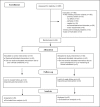Assessing and restoring cognitive functions early after stroke
- PMID: 25764255
- PMCID: PMC4370438
Assessing and restoring cognitive functions early after stroke
Abstract
Cognitive impairment is a frequent complication of stroke. The aim of this study was to evaluate the effectiveness of cognitive training performed early after stroke. Ninety-two patients were randomly assigned to either the study group (SG) or the control group (CG). Cognitive rehabilitation consisted of 16 individual one-hour sessions in which patients performed therapist- guided computer exercises. The patients in the CG performed a sham intervention. After four weeks all the patients were re-evaluated. In the SG, significant improvements (p<0.05) were detected in all neuropsychological measures at the post-training evaluation, while the CG showed mild (not statistically significant) improvements on cognitive tests. Between-group analysis revealed statistically significant differences in the domains of memory and visual attention. Cognitive training performed early after stroke seems to be a viable option for improving cognitive outcome in stroke survivors. Further studies should assess whether this may favor their reintegration into everyday life.
Figures
References
-
- Adams HJ, Jr, Adams RJ, Brott T, et al. Guidelines for the early management of patients with ischemic stroke: a scientific statement from the stroke council of the American Stroke Association. Stroke. 2003;34:1056–1083. - PubMed
-
- Apollonio I, Leone M, Isella V, et al. The Frontal Assessment Battery (FAB): normative values in an Italian population sample. Neurol Sci. 2005;26:108–116. - PubMed
-
- Basso A, Capitani E, Laiacona M. Raven’s coloured progressive matrices: normative values in 305 adult normal controls. Funct Neurol. 1987;2:189–194. - PubMed
-
- Bernhardt J, Indredavik B, Langhorne P. When should rehabilitation begin after stroke? . Int J Stroke. 2013;8:5–7. - PubMed
Publication types
MeSH terms
LinkOut - more resources
Full Text Sources
Medical

